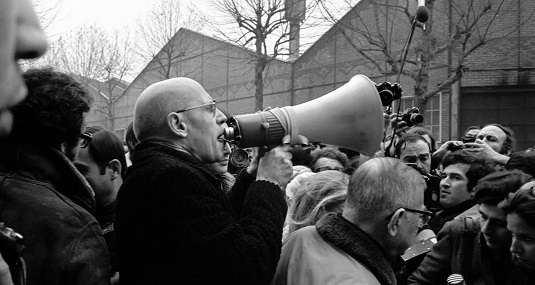
I'll be presenting something too, so I'm unlikely to surface from the Foucault mines this weekend. This is what my paper is on.
Retro Foucault, Our Contemporary? Revisiting The Subject and Power Afterword at a Time of Desubjectivation Crisis
The contemporary reception of Foucault as a theorist governance has proven extremely influential at explaining how Western governments have reshaped their institutions to encourage the formation of neoliberal subjectivities. However, with falling living standards, stagnant wages, and restricted housing supply, the offer of social mobility and material abundance that has worked as the carrot to the neoliberal stick of surveillance and punitive measures suggests the assemblage supporting this form of governance is breaking down. This is not a crisis of the passage from logics of discipline to logics of control (Deleuze 1992), but a more fundamental problem of desubjectivation. That is, a withering away of relations and motivations that provide neoliberal capitalism everyday legitimacy and justification, with more reliance on mechanisms of “machinic enslavement” (Lazzarato 2014). In Britain, the likely election of a government that defines itself in relation to an ethic of public service, has a programme of refurbishing institutions of state, and has the ambition to restore their authority, will have to face up to this problem. At the time of writing, the Labour Opposition’s discourse on social security and the centrality of employment suggests they do not recognise the challenge or are relying on the need to work – one machinic compulsion among many that Lazzarato identifies – to maintain the order necessary for their project. In parallel with this, Labour has emphasised its support for authoritarian state institutions, has ostentatiously dressed itself up in national colours, has flirted with socially conservative positions, regularly invokes ‘security’ as a theme, and has presided over an authoritarian internal party regime, which likely indicates its policy approach to domestic questions and law and order.
This is where the “old” Foucault of the microphysics of power might prove useful. By returning to his famous afterword, The Subject and Power, in Dreyfus and Rabinow (1982), we find a useful toolkit for analysing political efforts that either found post-neoliberal forms of subjectivation or co-opt other subjectivities that have grown up in resistance to neoliberal governance to patch up/maintain prevailing assemblages of extraction, exploitation, and control. As Labour is offering a state-centred political project, Foucault’s sketches of pastoral power and attacks on forms of individualism congenial to the operation of state institutions, his analytical separation of power from linguistics and sign systems, understanding as power as action on action, the constitution of “others”, and the how points of agonism and tension are incorporated into dominant modes of governance, as well as Foucault’s five methodological points for analysing power so we can make sense of what Negri (2017, p.161) calls a circulation of “command, exclusion and violence” are essential points of departure for analysing and anticipating what is likely to come. While accepting Deleuze’s (and Foucault’s!) argument that disciplinary techniques and logics are obsolete in the absence of a regime of control, a politics of re-founding and re-emphasising the state as the official centre of social life makes a return to the crude technologies of power more likely.
Image Credit
No comments:
Post a Comment